Hyundai Ioniq CCS Charge Inlet 91684-G7010: Difference between revisions
m MoonUnit moved page Hyundia Ioniq CCS Charge Inlet 9184-G7010 to Hyundai Ioniq CCS Charge Inlet 91684-G7010: misspelt original page |
mNo edit summary |
||
| Line 1: | Line 1: | ||
[[File:Charge inlet backshell.jpg|thumb|Backshell showing LED connector at top and actuator middle]] | [[File:Charge inlet backshell.jpg|thumb|Backshell showing LED connector at top and actuator middle]] | ||
[[File:CCS inlet rhs.jpg|thumb|Shows 2.7K resistor block on right hand side of inlet, LED connector on top]] | [[File:CCS inlet rhs.jpg|thumb|Shows 2.7K resistor block on right hand side of inlet, LED connector on top]] | ||
The Hyundai Ioniq AE CCS Charge Inlet part number 91864-G7010 combines a Type 2 charge port (single phase) with a CCS2 DC inlet. The full part is shown below with approx. 2M of shielded DC cable, a TE AMP+ connector for the Hyundai battery pack, connector to onboard charger and 14-way plug presumably connecting to the car's charge controller. There are plastic 'pass through' mouldings that mount and route the HV DC cables, and a cable release for manually releasing the charge port lock pin. | The Hyundai Ioniq AE CCS Charge Inlet part number 91864-G7010 combines a Type 2 charge port (single phase) with a CCS2 DC inlet. The full part is shown below with approx. 2M of shielded DC cable, a TE AMP+ connector for the Hyundai battery pack, connector to onboard charger and 14-way plug presumably connecting to the car's charge controller. There are orange plastic 'pass through' mouldings that mount and route the HV DC cables which can be removed, and a cable release for manually releasing the charge port lock pin if it gets stuck in the inlet. | ||
[[File:Hyundai CCS charge port.jpg|thumb|Full cable assembly with charge inlet, battery connector, OBC connector]] | [[File:Hyundai CCS charge port.jpg|thumb|Full cable assembly with charge inlet, battery connector, OBC connector]] | ||
[[File:CCS inlet.jpg|thumb|CCS inlet. Charge port LED shown at top]]The charge port inlet has a two part backshell, with DC HV cables exiting via a right angle backshell. These are fairly easily removed but the plastic tabs are weak. The charge port lock actuator screws to the left side of the charge port and a manual wire pull release attaches to it to pull the locking pin back out. | [[File:CCS inlet.jpg|thumb|CCS inlet. Charge port LED shown at top]]The charge port inlet has a two part backshell, with DC HV cables exiting via a right angle backshell. These are fairly easily removed but the plastic tabs are weak. The charge port lock actuator screws to the left side of the charge port and a manual wire pull release attaches to it to pull the locking pin back out if required. | ||
The actuator requires 12V across orange and blue wires, reversed to change the actuator direction. The other two wires (red and yellow) from the actuator are probably a feedback mechanism, but is not resistance-based feedback. | |||
An LED is mounted in the top of the port, above the AC input. | An LED is mounted in the top of the port, above the AC input. | ||
| Line 11: | Line 13: | ||
[[File:14 way connector top side.jpg|thumb|Wire side of 14 way connector, top side. Pin 1 top right: brown-black, pin 8 below it: black.]] | [[File:14 way connector top side.jpg|thumb|Wire side of 14 way connector, top side. Pin 1 top right: brown-black, pin 8 below it: black.]] | ||
[[File:14 way connector bottom view.jpg|thumb|Bottom view of 14 way connector. Bottom row starts at pin 8, black, at the top]] | [[File:14 way connector bottom view.jpg|thumb|Bottom view of 14 way connector. Bottom row starts at pin 8, black, at the top]] | ||
There is a 'commoning block' that connects the AC cable shielding, the paired CP/PP cable shielding and PE itself to a common wire into the 14 way connector. | There is a 'commoning block' that connects the AC cable shielding, the paired CP/PP cable shielding and PE itself to a common wire (pin 12) into the 14 way connector. | ||
The inlet has only one thermistor, positioned between the two DC HV cables in the inlet. | The inlet has only one thermistor, positioned between the two DC HV cables in the inlet. | ||
| Line 84: | Line 86: | ||
|CP | |CP | ||
|} | |} | ||
Note that there are no resistors in the inlet CP to 14 way plug, but there is a 2.7K detachable resistor between PP and PE. | Note that there are no resistors in the inlet CP to 14 way plug, nor from the inlet PP to the 14 way plug, but there is a 2.7K detachable resistor between PP and PE. | ||
Revision as of 17:05, 6 June 2024
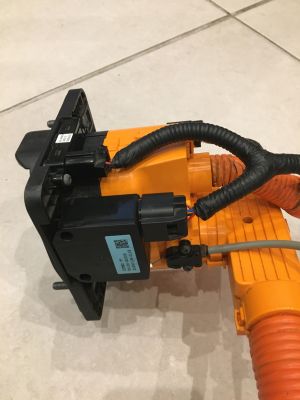
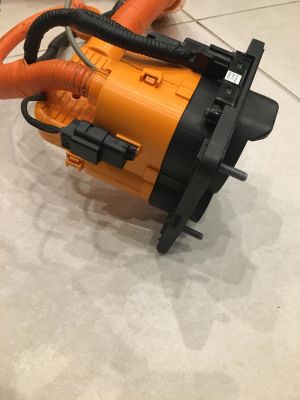
The Hyundai Ioniq AE CCS Charge Inlet part number 91864-G7010 combines a Type 2 charge port (single phase) with a CCS2 DC inlet. The full part is shown below with approx. 2M of shielded DC cable, a TE AMP+ connector for the Hyundai battery pack, connector to onboard charger and 14-way plug presumably connecting to the car's charge controller. There are orange plastic 'pass through' mouldings that mount and route the HV DC cables which can be removed, and a cable release for manually releasing the charge port lock pin if it gets stuck in the inlet.
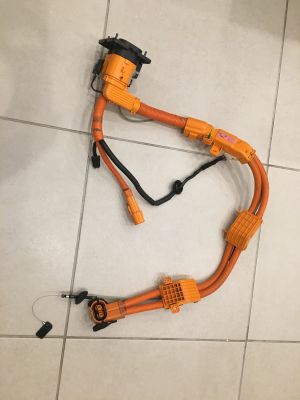
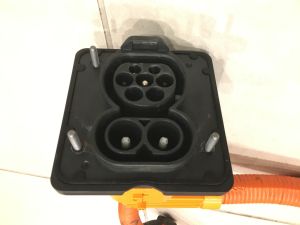
The charge port inlet has a two part backshell, with DC HV cables exiting via a right angle backshell. These are fairly easily removed but the plastic tabs are weak. The charge port lock actuator screws to the left side of the charge port and a manual wire pull release attaches to it to pull the locking pin back out if required.
The actuator requires 12V across orange and blue wires, reversed to change the actuator direction. The other two wires (red and yellow) from the actuator are probably a feedback mechanism, but is not resistance-based feedback.
An LED is mounted in the top of the port, above the AC input.
On the right hand side is a resistor block containing a 2.7K resistor between PE and PP.
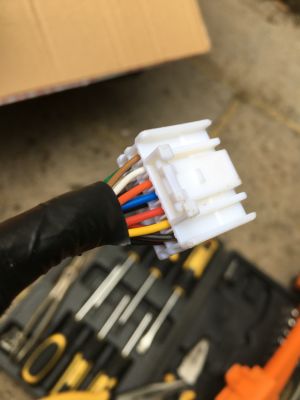
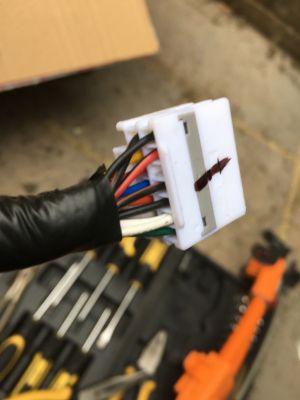
There is a 'commoning block' that connects the AC cable shielding, the paired CP/PP cable shielding and PE itself to a common wire (pin 12) into the 14 way connector.
The inlet has only one thermistor, positioned between the two DC HV cables in the inlet.
There is a 3 way AC connector for the on board charger.
The 14 way connector pinout is described below. Pin numbering starts at the top right pin when looking from the wire side of the plug, and is black/brown. Pin 8 starts on right hand side of bottom row, black.
Pinout:
| Pin | Colour | Description |
|---|---|---|
| 1 | black/brown | Shielding of CP/PP pair, also connected to pin 11 and PE earth (pin 12), and shielding of AC cable |
| 2 | yellow | Actuator lock feedback, presumed |
| 3 | red | Actuator lock feedback, presumed |
| 4 | blue | Actuator lock motor |
| 5 | orange | Actuator lock motor |
| 6 | white | Thermistor, presumed NTC 10K, DC cable pair |
| 7 | brown | Thermistor, presumed NTC 10K, DC cable pair |
| 8 | black | Charge port LED -ve |
| 9 | red/black | Charge port LED +ve |
| 10 | not used | not used |
| 11 | black/brown | Shielding of CP/PP pair, also connected to pin 1 and PE earth (pin 12), and shielding of AC cable |
| 12 | black | PE, also connected to pins 1 and 11 |
| 13 | 2 white wires | PP. One white wire direct to PP pin at inlet, one white wire to one side of detachable 2.7K resistor. Other side
of resistor (thin blue) goes to commoning block and eventually pin 12, PE. |
| 14 | green | CP |
Note that there are no resistors in the inlet CP to 14 way plug, nor from the inlet PP to the 14 way plug, but there is a 2.7K detachable resistor between PP and PE.